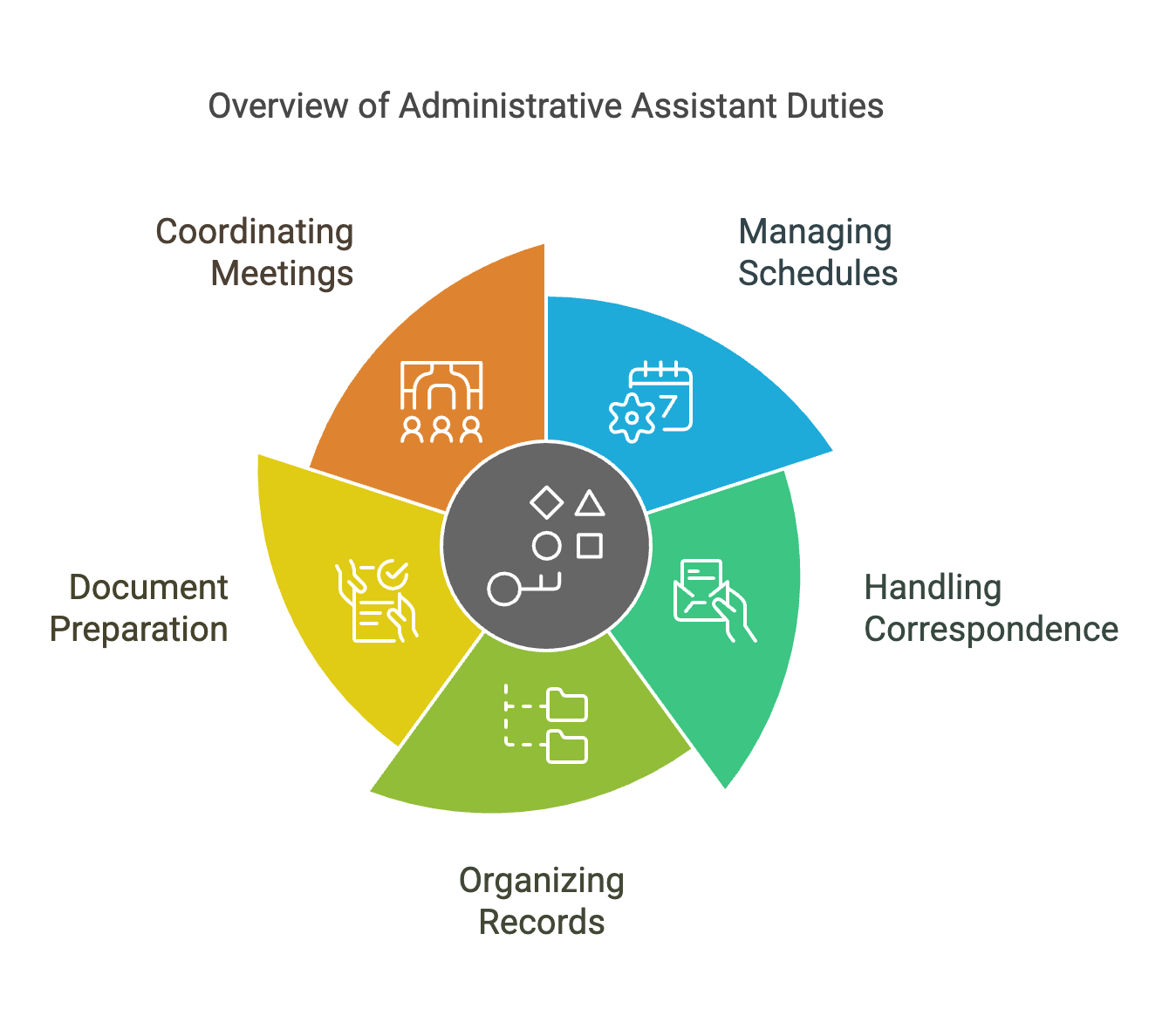An administrative assistant (AA) plays a crucial role in ensuring the smooth operation of an organization by managing various administrative tasks, such as scheduling appointments, organizing meetings, handling correspondence, and maintaining filing systems. Hiring the right administrative assistant is vital, as their skills in decision-making, organizational management, and communication can transform them into game changers for CEOs, enabling better time management and streamlined processes that ultimately contribute to the organization’s success.
An amazing administrative assistant possesses exceptional organizational skills, adaptability, strong communication abilities, and a proactive problem-solving mindset, enabling them to efficiently manage tasks and support their team or executive in a dynamic business environment.
Interested in connecting with the best administrative assistants with skills that match your needs? With Go Carpathian, businesses can hire the best administrative assistants from Eastern Europe, South Africa, and Latin America. Talk to the recruiting specialist!
In this article, we will cover what an administrative assistant does, what are their qualifications and essential skills, how can their role evolve, and how to hire an administrative assistant.
Administrative Assistant Responsibilities
Most administrative assistant has a diverse set of duties and responsibilities that are essential for the efficient functioning of an office. Key duties include:
Managing schedules and appointments: Administrative assistants organize and maintain calendars, ensuring that meetings and appointments are scheduled effectively to optimize time management.
Handling correspondence: Administrative assistants manage communication by answering phone calls, responding to emails, and distributing letters, ensuring that all correspondence is handled promptly and professionally.
Organizing and maintaining records and files: They create and maintain both electronic and physical filing systems, ensuring that important documents are easily accessible and well-organized.
Assisting with document preparation and data entry: This includes preparing reports, memos, and other documents while also entering data accurately into databases or spreadsheets.
Coordinating meetings and taking meeting minutes: They arrange meetings, prepare agendas, and document discussions and decisions made during these meetings to keep all stakeholders informed.
What Does an Administrative Assistant Do Across Different Industries?
Business owners should consider hiring an AA when they find themselves overwhelmed with administrative tasks that detract from their core responsibilities or when their team is expanding. An effective AA can alleviate these burdens, allowing leaders to focus on growth and strategic planning. Administrative assistants play pivotal roles across various industries, each tailored to meet specific operational needs and enhance overall productivity:
Corporate Office Settings
In corporate environments, AAs manage schedules, coordinate meetings, manage the office management systems and handle correspondence, which streamlines communication and ensures executives can focus on strategic initiatives. They can significantly impact by improving workflow efficiency and managing complex calendars, thus enabling better time management for executives.
Marketing Agencies
In marketing agencies, administrative assistant duties organizing digital asset libraries, managing social media calendars, and preparing marketing materials. Their support in tracking campaign metrics allows teams to make data-driven decisions quickly, thereby enhancing the agency’s responsiveness to market changes.
Education Sector
School administrative assistants are essential for maintaining student records, scheduling appointments with parents and teachers, and organizing school events. Their role is crucial in ensuring that educational institutions run smoothly, providing a supportive environment for both students and faculty.
Government and Nonprofit Organizations
In government and nonprofit sectors, administrative assistant duties include compliance tasks, managing public inquiries, and coordinating community outreach programs. Their organizational skills are vital for maintaining transparency and efficiency in operations, which is especially important in these often resource-constrained environments.
Administrative Assistant Qualifications and Essential Skills
Administrative assistants are essential to the smooth functioning of organizations across various industries, and their qualifications and skills are critical for success in this role. Here are the essential skills and qualifications that AAs must possess:
Technical Skills
AAs should be proficient in Microsoft Office (Word, Excel, PowerPoint, Outlook) and Google Suite, as these tools are fundamental for document creation, data analysis, and communication. Additionally, skills in database management are important for maintaining accurate records and generating reports, which enhances productivity and supports data-driven decision-making.
Communication and Interpersonal Skills
Strong communication skills, both written and verbal, are vital for AAs as they often serve as the first point of contact for clients and colleagues. This includes drafting emails, managing correspondence, and effectively interacting with diverse stakeholders to facilitate a collaborative work environment.
Organizational and Time Management Abilities
Administrative assistants must possess excellent organizational skills to manage multiple tasks efficiently. They need to prioritize their workload effectively to meet deadlines, ensuring that all administrative functions run smoothly without oversight.
Problem-Solving and Multitasking Capabilities
The ability to problem-solve and think critically is essential for administrative assistants, enabling them to navigate unexpected challenges and adapt to changing priorities. Their multitasking capabilities allow them to handle various responsibilities simultaneously while maintaining quality and accuracy in their work.
Attention to Detail and Confidentiality Handling
A keen attention to detail is crucial for ensuring accuracy in data entry, document preparation, and record-keeping. Additionally, AAs must handle sensitive information with the utmost confidentiality, maintaining professionalism in all interactions.
How The Role of Administrative Assistant Can Evolve
Over time, administrative assistants can grow into a variety of senior roles that leverage their organizational, communication, and problem-solving skills. They can transition to Executive Assistants (EAs), where they provide high-level support to executives and manage complex schedules. Many AAs also evolve into Project Managers (PMs), overseeing timelines, budgets, and team coordination for key initiatives, or Operations Managers, focusing on streamlining business processes and improving efficiency across departments. Additionally, they may move into roles like Office Manager, managing staff and daily office operations, or Human Resources Coordinator, assisting with recruitment and employee relations. For those with specialized interests, paths like Marketing Coordinator, Administrative Services Manager, or even Procurement Analyst are viable options. With experience, certifications (e.g., CAP or PMP), and a proactive mindset, administrative assistants can carve out rewarding careers in leadership and strategic roles.
The role of administrative assistants is evolving significantly, influenced by technological advancements, the rise of remote work, and the increasing complexity of business operations:
Impact of Technology and Automation: Technology has transformed the administrative landscape, automating routine tasks such as scheduling and document management. This shift allows administrative assistants to focus on more strategic responsibilities, such as project management and data analysis, enhancing their value within organizations. The integration of advanced tools and software has made AAs essential in navigating digital communication and collaboration platforms, which are critical for efficient workflow in modern workplaces. Some of the key tools include task management apps like Todoist and Trello, communication tools like Zoom and Slack, and AI-powered assistants like ChatGPT.
Virtual Administrative Assistants and Remote Work: The rise of remote work has led to the development of virtual assistants, who support teams from various locations. These professionals manage virtual meetings, coordinate across time zones, and ensure effective communication in a distributed work environment. This flexibility not only broadens the talent pool for employers but also allows AAs to take on roles that require greater adaptability and tech-savviness.
Advanced Job Responsibilities: As AAs evolve, they increasingly assume advanced responsibilities beyond traditional administrative tasks. Administrative assistant job descriptions may include project management, overseeing timelines and deliverables, or social media management, helping to shape a company’s online presence. By taking on these roles, AAs contribute directly to strategic initiatives and organizational goals, positioning themselves as vital team members rather than mere support staff.
Career Growth and Advancement Opportunities
The career growth and advancement opportunities for administrative assistants are diverse and can lead to fulfilling roles across various sectors:
Entry-level to Senior Administrative Roles
Starting as an administrative assistant often serves as a foundation for career progression. Administrative assistants can advance to executive assistant positions, where they manage executive schedules and provide high-level support, or move into roles such as office managers, overseeing daily operations and staff management. These transitions typically require the development of strong organizational skills and an understanding of office dynamics.
Specializations and Certifications
To enhance their qualifications, AAs can pursue specializations and certifications such as the Certified Administrative Professional (CAP) or become a Microsoft Office Specialist. These credentials not only validate their skills but also make them more competitive in the job market, opening doors to specialized positions that require advanced knowledge in specific areas.
Transitioning to Executive Assistant or Office Manager Positions
As administrative assistants gain experience and demonstrate their capabilities, they may transition into roles like executive assistant or office manager, which involve increased responsibilities such as project management, budgeting, and strategic planning. This shift often requires a proactive approach to taking on additional duties, showcasing leadership potential, and building relationships within the organization.
How to Hire an Administrative Assistant
To effectively hire an administrative assistant, business owners should begin by clearly defining the administrative assistant job description and outlining specific tasks and responsibilities to attract suitable candidates. Next, they need to establish a competitive salary range based on market research and the complexity of the role. After that, businesses need to make sure they post job advertisements on relevant job boards and social media platforms to reach a broader audience. During the interview process, business owners should focus on assessing candidates’ skills through situational questions and practical assessments to gauge their problem-solving abilities and fit within your company culture. The final step is conducting thorough reference checks to ensure the reliability and suitability of the chosen candidate before making a formal offer.
Business owners can look for administrative assistant positions on freelance platforms like Upwork, and job boards like Indeed or Monster, or they can use social media platforms like LinkedIn and contact candidates directly.
Another great way to hire an administrative assistant is to outsource work offshore. With professional outsourcing service providers like Go Carpathian, business owners can tap into the pool of global talent in Eastern Europe, South Africa, and Latin America and hire high-quality professionals while reducing hiring costs.
How to Write an Administrative Assistant Job Description
To write a customized job description for an administrative assistant job that suits your specific needs, start by clearly defining the job title and location. In the job summary, provide a brief overview of your company and the role’s importance in supporting daily operations.
Key Components to Include:
Responsibilities: List essential duties such as managing schedules, handling correspondence, organizing files, and assisting with meetings. Tailor these responsibilities to reflect the unique requirements of your organization.
Qualifications: Specify the necessary skills and experience, including technical skills (e.g., proficiency in Microsoft Office or Google Suite), communication abilities, and organizational skills. Consider including any preferred certifications like CAP or Microsoft Office Specialist.
Work Environment: Describe the company culture and work environment to attract candidates who align with your values.
Administrative Assistant Job Description Example
Job Title: Administrative Assistant
Location: [Company X, City, State]
Date: February 3, 2025
Job Summary:
At [Company X], we owe our success to our dedicated team, and we are currently seeking an exceptional Administrative Assistant to support our operations. The ideal candidate will be a proactive problem solver with excellent communication skills and a keen attention to detail. This role requires experience in an office environment, performing administrative tasks, and providing support to colleagues.
Objectives of This Role:
Serve as the eyes and ears of the entire office, providing information, answering questions, and responding to requests.
Ensure optimal use of office equipment and office supplies through preventive maintenance.
Maintain workflow by analyzing and refining standard operating office procedures.
Coordinate internal and external resources to expedite workflow.
Oversee organizational goals while upholding best practices.
Responsibilities:
Manage a busy, multiline phone system and greet guests as they enter the office.
Provide administrative support to senior leaders, including email correspondence and document preparation.
Plan, organize, and schedule appointments in-office, off-site, and via videoconference.
Coordinate travel arrangements for employees.
Maintain filing systems and contact databases.
Order office supplies and manage food deliveries for meetings.
Required Skills and Qualifications:
High school diploma or equivalent; college degree preferred.
Proven administrative experience in an office setting.
Superb written and verbal communication skills.
Strong time-management skills with the ability to multitask.
Proficiency in learning new software systems.
Preferred Skills and Qualifications:
Previous experience in office management or similar roles.
Familiarity with budget management and expense reporting.
Experience developing internal processes and filing systems.
Comfortable handling confidential information.
This job description outlines the fundamental aspects of the Administrative Assistant role at [Company X], tailored to meet our specific operational needs while highlighting the skills necessary for success in this position.
Want to Hire an Administrative Assistant?
Hiring an administrative assistant provides key benefits such as improved organizational efficiency, enhanced communication, and the ability to free up valuable time for executives, while essential skills for the role include strong organizational abilities, effective communication, proficiency in office software, and problem-solving capabilities.
A career in administrative support is an excellent choice for those who enjoy organization, problem-solving, and being an essential part of a team’s success. Administrative professionals are the backbone of any organization, ensuring that operations run smoothly and efficiently while playing a vital role in supporting leadership and staff. This career path offers stability, flexibility, and opportunities for growth, with clear advancement into roles such as executive assistant or office manager. It’s a chance to develop highly transferable skills like communication, time management, and technical proficiency. If you’re someone who thrives in dynamic environments and loves making a meaningful impact behind the scenes, a career in administrative support can be both rewarding and fulfilling!
Interested in outsourcing an administrative assistant role? With Go Carpathian, you can hire the top talent overseas while reducing hiring costs. Schedule a Discovery Call to learn more.






